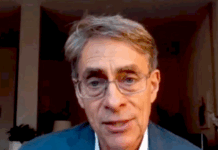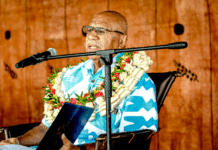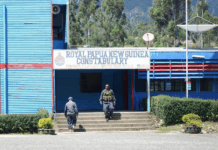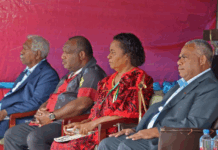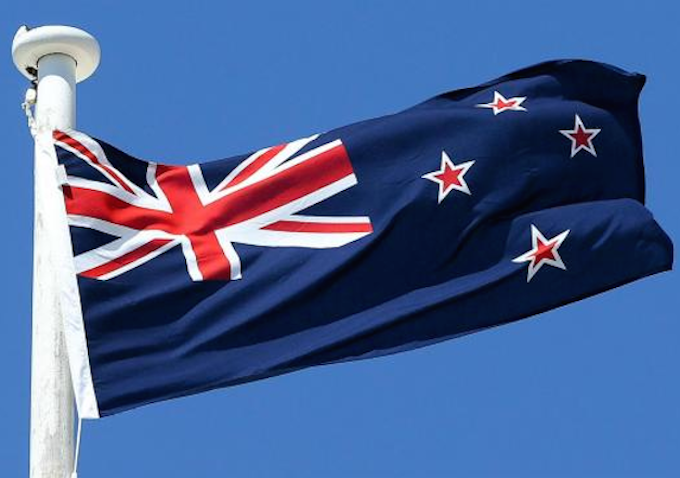
By Kendall Hutt in Auckland
For those seeking an independent foreign policy, the time is now, says the organiser of a New Zealand independence movement in the wake of a “crumbling” United States empire.
Murray Horton, national coordinator for the Campaign Against Foreign Control of Aotearoa (CAFCA), a Christchurch-based organisation which has been “flying the flag for an independent New Zealand” since the 1970s, told a public seminar at Auckland University of Technology last week that the US had reached its “tipping point”.
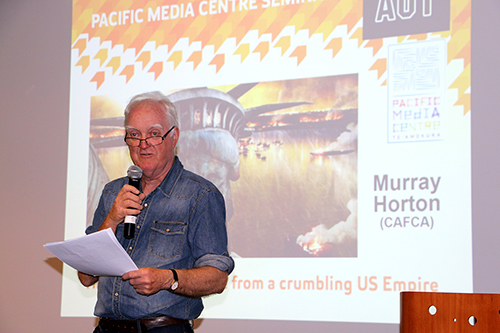
Horton highlighted how famous slogans such as ‘Make America Great Again’, repeated ad nauseam by a “Mussolini with hair” — President Donald Trump — provided the ideal opportunity for New Zealand to launch its own independent, non-aligned foreign policy.
“CAFCA thinks that gaining true independence from the American empire and becoming non-aligned is an idea whose time has well and truly come,” Horton said at the AUT Pacific Media Centre-hosted seminar.
“It is not ‘anti-American’ or racist or xenophobic for that matter … We stand with the American people who are currently fighting back in their millions against the daily outrages being perpetrated by Trump and his reactionary billionaire cronies.”
Greater evidence still was the fact the Christchurch Press, which once “faithfully parroted the US and UK propaganda line” when owned by Rupert Murdoch, had urged in an editorial that ties with the US should be on New Zealand’s terms.
Horton noted this was “really quite extraordinary”.
China’s steady rise
Further evidence of America’s undoing was China’s steady rise as an economic and military power and the fact that the US had been “reduced to one player among many” in the Middle East, especially in Syria, said Horton.
“Putin’s Russia is sticking it to America across a whole spectrum of issues in a richly ironic turn of events.”
More importantly, however, Horton stressed it was time for New Zealand to grow up.
“Don’t muck around with the half pie solutions, go for the full pie solution. Get shot of Mother England and Uncle Sam. It’s called leaving home and living your own life and it’s what all of us do in the much-vaunted ‘real world’ and it’s called being independent.”
But there is some light at the end of the tunnel, Horton noted.
This was because New Zealand had taken steps towards an independent foreign policy regarding its nuclear free stance and presence of non-combat troops in Iraq and Afghanistan.
“For the first time ever we stayed out of someone else’s war.”
Nuclear-free pride
Horton said being nuclear free is “something to be really proud of”.
“It puts New Zealand well ahead of other countries.”
However, these foreign policy advancements were the exception and not the rule, Horton added.
“Things haven’t progressed from there and the powers that be both in New Zealand and the US have been actively working to nullify those facts on the ground, sending war ships out here for example, to get around them, to subvert them and render them irrelevant.”
This comes down to the fact New Zealand’s military continued to be “guns for fire” in other people’s wars and its ongoing participation in the “Five Eyes” intelligence network.
“We are the most loyal and junior satellite in the vitally important, covert ‘Five Eyes’ intelligence alliance, slavishly doing the bidding of both the US government and American transnational corporations when told to do so.”
Such “loyal” participation had seen New Zealand’s military role in Afghanistan under the spotlight in Nicky Hager and Jon Stephenson’s book Hit & Run, Horton said.
‘Own two feet’
But what would an independent, non-aligned foreign policy look like?
Horton seemed to leave no stone unturned as he explained what it should look like.
“An independent foreign policy means not being part of anyone’s empire, but standing on our own two feet and picking and choosing our friends and allies based on what is in our national interest and in the public interest,” explained Horton.
Although this would not mean New Zealand would be neutral or isolationist, Horton stressed.
“It would mean that New Zealand would pick her allies and, if necessary, our wars, on a case by case basis decided first and foremost by what’s in the interest of the New Zealand people, not the interests of foreign governments and/or corporations.”
This would mean cutting the strings that continue to bind us to the American Empire, namely closing the Government Communication Security Bureau’s (GCSB) “US National Security Agency (NSA) bases” and abolishing the GCSB itself, “which is simply a junior contractor for the US NSA”, Horton said.
New Zealand’s current foreign policy mindset means that the country was missing the boat on addressing key global challenges such as climate change, Horton said.
‘Much more activist’
Horton added New Zealand needed to be “much more activist” regionally in order to do so.
“Politicians have always said being in the club allows us to punch above our weight and eat at the big boys’ table. Good, let’s do something about facing global issues.”
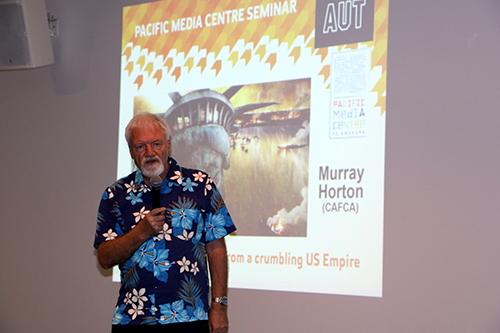
“As a first world capitalist economy we’re part of the climate change problem that threatens the whole world and nowhere more imminent than for our tiny Pacific neighbours.
“There is clamour for New Zealand to take in refugees…The inhabitants of these doomed atolls need to be at the top of the list. All of them, if necessary … This is not a solution to the problem of climate change … it is merely a reaction to the problem, and recognition that we have a responsibility to help our neighbours who we’ve harmed.”
Horton said New Zealand would achieve all of these aims and an independent foreign policy through the Aotearoa Independence Movement, a campaign which will initiate and drive nationwide dialogue on what independent economic, military and political policy should look like.
“Let us provide the means for discussing, defining and deciding what would be involved in that and everything that would flow from it and decide what that would mean and how to get there I think you’ll agree is a discussion Aotearoa needs to have and that now is the time to have it.”
- LIVE: CAFCA’s Murray Horton on foreign policy and NZ’s independence
- CAFCA calls on NZ to ‘pull the plug’ on American Empire
Kendall Hutt is the Pacific Media Centre’s Pacific Media Watch freedom project editor for 2017.





